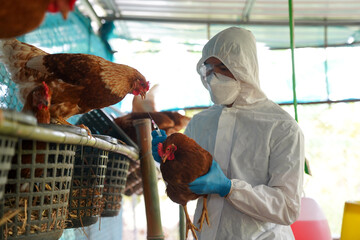A new report is claiming that the bird flu has taken a “dangerous” step toward infecting human beings. New analysis of the version of bird flu which has spread to cattle on more than 100 farms in the United States suggests that the virus has mutated, which could eventually lead to it being spread to humans by breathing.
A newer and more detailed analysis by scientists at the University of Wisconsin-Madison in the U.S. shows viral samples taken from cows were able to attach to receptors found on cells in the human respiratory tract, according to a report by Stat News. The version of H5N1 found in birds is unable to do that, suggesting the bovine virus has mutated.
So far, the “authorities” have tested enough people to find four infections in humans. All human infections have shown up in those working with animals and have so far only had mild symptoms. The bird flu virus also did not pass on to anyone else in all of the four cases.
The H5N1 virus, more commonly found in birds, has so far been confirmed in cattle on more than 100 farms in 12 states, with inactivated fragments of the strain being found in pasteurized milk on supermarket shelves.
H5N1 Bird Flu Infects 2 Children In Cambodia
Dr. Ed Hutchinson, from the Medical Research Council and University of Glasgow Centre for Virus Research, said that tests on ferrets found that the bovine version of the bird flu virus could not easily spread by breathing, but there were still “reasons to be concerned”.
“When they compared their cow flu isolate to bird flu they found that it had already begun to gain some of the properties that would be associated with the ability to spread effectively through respiratory infections in humans,” said Dr. Hutchinson, who was not involved in the study.
“To be clear, it does not appear to be doing this yet, and none of the four human cases so far reported have shown signs of onward transmission. However, this new H5N1 influenza virus would be even harder to control, and even more dangerous to humans, if it gained the ability for effective respiratory spread. Although it is good news that cow flu cannot yet do this, these findings reinforce the need for urgent and determined action to closely monitor this outbreak and to try and bring it under control as soon as possible,” Dr. Hutchinson added.
The Overhyped Threat of a Human Bird Flu Pandemic is a Hoax to “Reset” Our Food System
Read full article here


